French singer, composer and film actor Gilbert Bécaud (1927-2001) was known as Monsieur 100,000 Volts for his energetic performances. For nearly fifty years France hummed the melodies of this charming music hall star, dark blue suited, white shirted, and recordedly always wearing his lucky tie (but not on the postcards in this post). He also appeared in several films.
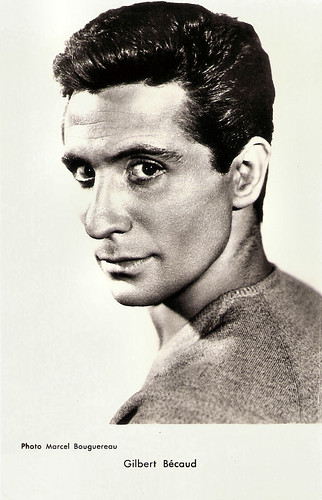
French postcard by Editions P.I,, offered by Les Carbones Korès Carboplane, no. 1092 A. Photo: Marcel Bougureau.

French postcard by E.D.U.G., no. 274. Photo: Sam Lévin.

German promotion card by EMI Electrola, no. DrWa 1630. Photo: Serge Fleury.
Gilbert Bécaud was born François Gilbert Silly in 1927, in Toulon, France. François had a relatively happy upbringing, despite the fact that his father abandoned the family while François was still in early childhood.
Madame Silly’s new partner, Louis Bécaud, raised François and his siblings Jean and Odette as his own children, although he was never able to marry their mother (her first husband steadfastly refusing to consent to a divorce).
François learned to play the piano when he was five, and by the age of nine, he went to the Conservatoire de Nice. In 1942, he left this school to join the French Resistance during World War II.
In 1947, he made his first film appearance in an uncredited bit part as a pianist in La kermesse rouge/The Scarlet Bazaar (Paul Mesnier, 1947).
He began songwriting in 1948, after meeting Maurice Vidalin, who inspired him to write his early compositions. He began writing for Marie Bizet. Bizet, Bécaud and Vidalin became a successful trio, and their partnership lasted until 1950.
While touring as a pianist with singer Jacques Pills, Bécaud met Édith Piaf, Pills’ wife at the time. At her suggestion, he began to sing songs like Mes Mains and Les Croix in 1953. Piaf also suggested his stage name.

French postcard by Editions du Globe (E.D.U.G.), Paris, no. 250. Photo: Studio Harcourt.

French postcard by Editions du Globe (E.D.U.G.), Paris, no. 339. Photo: Studio Harcourt.
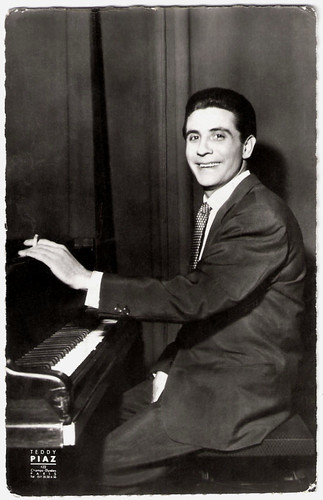
French postcard by Editions du Globe (E.D.U.G.), Paris, no. 409. Photo: Teddy Piaz, Paris.
Gilbert Bécaud made his stage debut in the Olympia in Paris in 1954. A year later he headlined at this famous venue, attracting 6,000 on his first night, three times the capacity.
His hits in the later part of the decade included La Corrida (1956), Le Jour où la Pluie Viendra (1957) and C'est Merveilleux L'amour (1958).
He also began to act in films during this period, starting with Le Pays D'où Je Viens/The Country I Come From (Marcel Carné, 1956) opposite Françoise Arnoul. The multi-talented Bécaud was also responsible for writing the film’s soundtrack.
Other films in which he appeared were Casino de Paris (Claude Barma, 1957) with Vittorio De Sica and Caterina Valente, and the comedy Croquemitoufle (Claude Barma, 1958).
In 1960, he won a Grand Prix du Disque and composed L'enfant à L'étoile, a Christmas cantata. That same year, Let It Be Me, an English version of Je t’ai dans la peau, which he had once written for Édith Piaf, became a hit for the Everly Brothers. Over the years, it would also be performed by Bob Dylan, Nina Simone, Elvis Presley, Willie Nelson, Jerry Butler, Sam & Dave, and James Brown.
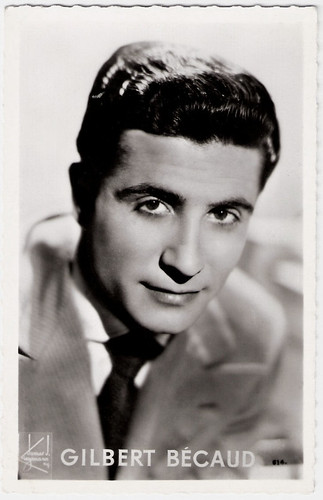
French postcard by Editions P.I, Paris, no. 614. Photo: James J. Kriegsmann.

Dutch postcard by 't Sticht, Utrecht, no. AX 6173.

Dutch postcard by Uitg. Takken, Utrecht, no. 3648. Photo: Hafbo. Gilbert Bécaud in Casino de Paris (Claude Barma, 1957).
In 1961, Gilbert Bécaud wrote and recorded Et Maintenant, one of the biggest selling singles in French history. Translated as What Now My Love, the song became a hit by Shirley Bassey, Sonny & Cher, Elvis Presley, Judy Garland, Andy Williams and Frank Sinatra.
After writing the opera L'opéra d'Aran, Bécaud toured through Europe and continued to record a string of hits, including Nathalie (1964) and Tu le Regretteras (1965), his controversial song for Charles de Gaulle.
He also co-wrote the international hit Love on the Rocks with Neil Diamond, which was featured on the soundtrack of The Jazz Singer (Richard Fleischer, 1980). Marlene Dietrich recorded his Marie, Marie and performed it in her stage shows.
In the 1970s, Bécaud focused more on touring than recording, and he also appeared in films like Un homme libre/A Free Man (Roberto Muller, 1972) with Olga Georges-Picot, and Toute une vie/And Now My Love (Claude Lelouch, 1973) with Marthe Keller.
In 1973 he finally took time off, citing exhaustion. The following year, he was named Chevalier in the Légion d'honneur. Then he scored a hit all over Europe with A Little Love And Understanding (1975).

French promotion card by Galeries Modernes Barjeaud. Photo: La Voix de son Maitre (HMV) / Larroque. Text: En souvenir de votre aimable visite aux Galeries Modernes Barjeaud pour le présentation de la collection ENTRÉE DE SAISON - Mars 1959. (In memory of your kind visit to the Modern Galleries Barjeaud for the presentation of the collection SEASON ENTRY - March 1959.)
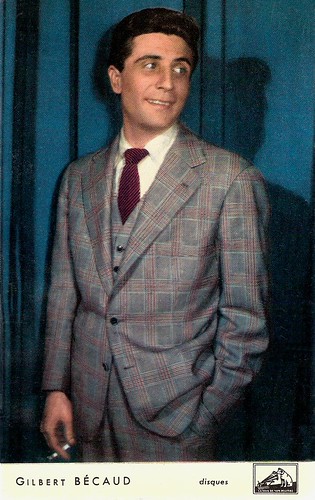
French postcard by JPH. Photo: Disques La Voix de son Maitre.
Later in the century, Gilbert Bécaud began writing with Pierre Grosz and then Neil Diamond, also co-penning the successful Broadway musical Madame Roza (1986), based on the novel La vie devant soi (Madame Rosa) by Emile Ajar.
The 1990s finally saw a slowdown of Bécaud's activity, releasing various compilations and touring occasionally. In 1993 he took an extended sabbatical, intending to get his health back in order. Bécaud's heavy smoking habit was still placing a great strain on his voice.
He did one more acting performance on television in the popular crime series Navarro (1995) starring Roger Hanin, but Bécaud really returned from his extended sabbatical in 1996, going back into the studio to work on a new album Ensemble.
The Olympia in Paris, where he had debuted, was his favourite venue. In 1997 Becaud was present for the re-opening of the Olympia after its reconstruction. With a series of concerts at the Olympia, he celebrated his 70th birthday.
Refusing to slip quietly into retirement, Bécaud returned to the media spotlight in 1999, releasing a new album entitled Faut faire avec…., and making a live comeback at the Olympia - for the 33rd time! Despite the fact that the singer was suffering from lung cancer, he nevertheless managed to pull out all the stops, giving a series of vibrant, energetic shows which went down extremely well with his fans.
In 2001 Gilbert Bécaud died on his houseboat on the Seine, aged 74. He was interred in the Père Lachaise cemetery in Paris. He had been married twice: to Monique Nicolas (they had three children), and to Kitty St John (two children). His eldest son, Gaya Bécaud, released his father’s last record after his death.

Dutch postcard by Gebr. Spanjersberg N.V., Rotterdam (Sparo), no. 811. Photo: HMV.
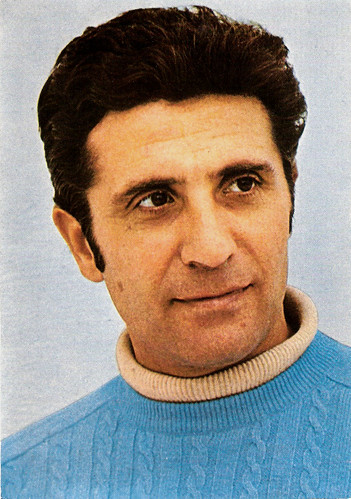
French postcard by Lyna, Paris, no. 2019. Photo: Tony Frank.
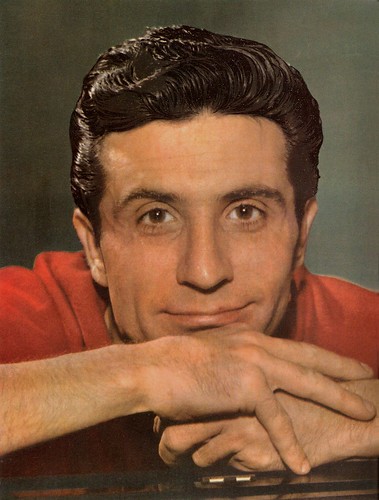
Vintage postcard.
Sources: Wikipedia, RFI Musique and IMDb.

French postcard by Editions P.I,, offered by Les Carbones Korès Carboplane, no. 1092 A. Photo: Marcel Bougureau.

French postcard by E.D.U.G., no. 274. Photo: Sam Lévin.

German promotion card by EMI Electrola, no. DrWa 1630. Photo: Serge Fleury.
Piaf
Gilbert Bécaud was born François Gilbert Silly in 1927, in Toulon, France. François had a relatively happy upbringing, despite the fact that his father abandoned the family while François was still in early childhood.
Madame Silly’s new partner, Louis Bécaud, raised François and his siblings Jean and Odette as his own children, although he was never able to marry their mother (her first husband steadfastly refusing to consent to a divorce).
François learned to play the piano when he was five, and by the age of nine, he went to the Conservatoire de Nice. In 1942, he left this school to join the French Resistance during World War II.
In 1947, he made his first film appearance in an uncredited bit part as a pianist in La kermesse rouge/The Scarlet Bazaar (Paul Mesnier, 1947).
He began songwriting in 1948, after meeting Maurice Vidalin, who inspired him to write his early compositions. He began writing for Marie Bizet. Bizet, Bécaud and Vidalin became a successful trio, and their partnership lasted until 1950.
While touring as a pianist with singer Jacques Pills, Bécaud met Édith Piaf, Pills’ wife at the time. At her suggestion, he began to sing songs like Mes Mains and Les Croix in 1953. Piaf also suggested his stage name.

French postcard by Editions du Globe (E.D.U.G.), Paris, no. 250. Photo: Studio Harcourt.

French postcard by Editions du Globe (E.D.U.G.), Paris, no. 339. Photo: Studio Harcourt.

French postcard by Editions du Globe (E.D.U.G.), Paris, no. 409. Photo: Teddy Piaz, Paris.
Let It Be Me
Gilbert Bécaud made his stage debut in the Olympia in Paris in 1954. A year later he headlined at this famous venue, attracting 6,000 on his first night, three times the capacity.
His hits in the later part of the decade included La Corrida (1956), Le Jour où la Pluie Viendra (1957) and C'est Merveilleux L'amour (1958).
He also began to act in films during this period, starting with Le Pays D'où Je Viens/The Country I Come From (Marcel Carné, 1956) opposite Françoise Arnoul. The multi-talented Bécaud was also responsible for writing the film’s soundtrack.
Other films in which he appeared were Casino de Paris (Claude Barma, 1957) with Vittorio De Sica and Caterina Valente, and the comedy Croquemitoufle (Claude Barma, 1958).
In 1960, he won a Grand Prix du Disque and composed L'enfant à L'étoile, a Christmas cantata. That same year, Let It Be Me, an English version of Je t’ai dans la peau, which he had once written for Édith Piaf, became a hit for the Everly Brothers. Over the years, it would also be performed by Bob Dylan, Nina Simone, Elvis Presley, Willie Nelson, Jerry Butler, Sam & Dave, and James Brown.

French postcard by Editions P.I, Paris, no. 614. Photo: James J. Kriegsmann.

Dutch postcard by 't Sticht, Utrecht, no. AX 6173.

Dutch postcard by Uitg. Takken, Utrecht, no. 3648. Photo: Hafbo. Gilbert Bécaud in Casino de Paris (Claude Barma, 1957).
A Free Man
In 1961, Gilbert Bécaud wrote and recorded Et Maintenant, one of the biggest selling singles in French history. Translated as What Now My Love, the song became a hit by Shirley Bassey, Sonny & Cher, Elvis Presley, Judy Garland, Andy Williams and Frank Sinatra.
After writing the opera L'opéra d'Aran, Bécaud toured through Europe and continued to record a string of hits, including Nathalie (1964) and Tu le Regretteras (1965), his controversial song for Charles de Gaulle.
He also co-wrote the international hit Love on the Rocks with Neil Diamond, which was featured on the soundtrack of The Jazz Singer (Richard Fleischer, 1980). Marlene Dietrich recorded his Marie, Marie and performed it in her stage shows.
In the 1970s, Bécaud focused more on touring than recording, and he also appeared in films like Un homme libre/A Free Man (Roberto Muller, 1972) with Olga Georges-Picot, and Toute une vie/And Now My Love (Claude Lelouch, 1973) with Marthe Keller.
In 1973 he finally took time off, citing exhaustion. The following year, he was named Chevalier in the Légion d'honneur. Then he scored a hit all over Europe with A Little Love And Understanding (1975).

French promotion card by Galeries Modernes Barjeaud. Photo: La Voix de son Maitre (HMV) / Larroque. Text: En souvenir de votre aimable visite aux Galeries Modernes Barjeaud pour le présentation de la collection ENTRÉE DE SAISON - Mars 1959. (In memory of your kind visit to the Modern Galleries Barjeaud for the presentation of the collection SEASON ENTRY - March 1959.)

French postcard by JPH. Photo: Disques La Voix de son Maitre.
Refusing to slip quietly into retirement
Later in the century, Gilbert Bécaud began writing with Pierre Grosz and then Neil Diamond, also co-penning the successful Broadway musical Madame Roza (1986), based on the novel La vie devant soi (Madame Rosa) by Emile Ajar.
The 1990s finally saw a slowdown of Bécaud's activity, releasing various compilations and touring occasionally. In 1993 he took an extended sabbatical, intending to get his health back in order. Bécaud's heavy smoking habit was still placing a great strain on his voice.
He did one more acting performance on television in the popular crime series Navarro (1995) starring Roger Hanin, but Bécaud really returned from his extended sabbatical in 1996, going back into the studio to work on a new album Ensemble.
The Olympia in Paris, where he had debuted, was his favourite venue. In 1997 Becaud was present for the re-opening of the Olympia after its reconstruction. With a series of concerts at the Olympia, he celebrated his 70th birthday.
Refusing to slip quietly into retirement, Bécaud returned to the media spotlight in 1999, releasing a new album entitled Faut faire avec…., and making a live comeback at the Olympia - for the 33rd time! Despite the fact that the singer was suffering from lung cancer, he nevertheless managed to pull out all the stops, giving a series of vibrant, energetic shows which went down extremely well with his fans.
In 2001 Gilbert Bécaud died on his houseboat on the Seine, aged 74. He was interred in the Père Lachaise cemetery in Paris. He had been married twice: to Monique Nicolas (they had three children), and to Kitty St John (two children). His eldest son, Gaya Bécaud, released his father’s last record after his death.

Dutch postcard by Gebr. Spanjersberg N.V., Rotterdam (Sparo), no. 811. Photo: HMV.

French postcard by Lyna, Paris, no. 2019. Photo: Tony Frank.

Vintage postcard.
Sources: Wikipedia, RFI Musique and IMDb.
8 comments:
This has brought back quite a number of memories for me!
Memories indeed! I didn't know I was that old! :D :D
Nathalie was a really cute tune; it brought a smile to my face. I think it's something every man can relate to. ;)
wow ! what a blog
wow ! what a blog
Thanks for all the nice comments. Hope to meet you again in blogosphere next Postcard Friendship Friday.
Very attractive man! :)
What a sweet, talented fellow he was. I had not realized how many familiar people and events Gilbert Bécaud was involved in. He must have been a charming man--I love his smile. Thank you for posting in Postcard Friendship Friday! I've missed hearing from you, my Friend.
Post a Comment